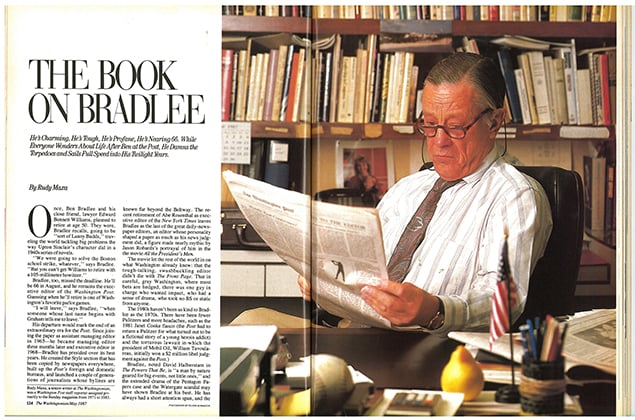It’s a sad state of affairs in this most political of cities: Somebody behaves in a roguish fashion at a big political dinner addressed by the Vice President, and the culprit turns out to be not a politician, but a football player.
Where have all the great political rogues gone?
When Redskin star running back John Riggins went into his now-famous monologue with Supreme Court Justice Sandra Day O’Connor and capped it by taking 40-plus winks on the floor at tableside, it brought tears to our eyes. It hurt to recall that 28 long years had passed since Representative T. James Tumulty of Jersey City made page one around the country by posing in white tie and tails for Dwight D. Eisenhower’s second inaugural ball—without his pants on.
We’ve had Watergate and all that in the intervening time, but that was knavery, not roguery. Our dictionary defines a rogue as “a wandering, disorderly, or dissolute person formerly accountable only under various vagrancy acts,” which falls considerably short of the leading indicted players of Richard M. Nixon’s coterie.
Our dictionary also describes a rogue as ” a dishonest, unprincipled person,” which seems a bit harsh to us, and as “a worthless fellow,” which seems too broad, inviting the inclusion of so many members of Congress, not to mention members of the Fourth Estate.
The remaining dictionary definition is more what we have in mind when we think of a political rogue: “a pleasantly mischievous person.” That is the essence of authentic roguery—the talent for saying or doing outrageous things while not hurting anybody much and without totally losing public affection.
• • •
The political firmament is studded with great political rogues of the past: the late Senator Everett Dirksen of Illinois and former governor James Rhodes of Ohio among the Republicans, and Representative Adam Clayton Powell of New York and Senator Fred Harris of Oklahoma among the Democrats, to name a few. Rhodes, who played golf so much that nobody noticed when he retired, may yet again enrich the political rogues’ gallery by leaving the links temporarily to run again in Ohio.
And then there is former senator Eugene McCarthy of Minnesota, always an iconoclast, now a sometime poet and lecturer living in rural Virginia. His rapier wit has been known to inflict wounds too deep to heal. A classic was his observation that fellow Senator Clifford Case of New Jersey, a mild-mannered and harmless man, was akin to a private sent out after the battle to shoot the wounded. McCarthy can be a charming fellow—when he is not writing cranky letters protesting observations about himself such as this one.
Enough of reminiscences. Who on the political scene today qualifies as an authentic rogue?
At the top of the list is Governor Edwards of Louisiana, who could play Gaylord Ravena!, the riverboat gambler in Show Boat, or Rhett Butler in Gone with the Wind without a dash of grease paint. Edwards, you may remember, chartered a jet plane to fly himself and a host of Louisiana Democrats to Paris last year to celebrate his inauguration. They all paid—$10, 000 apiece.
Edwards is under indictment on charges of somewhat more serious shenanigans-lining his pockets in the amount of $2 million in fraudulent hospital—construction deals. The 57-year-old governor has been under grand-jury investigation numerous other times, but this is the first he’s been indicted. In this regard, he’s like that legendary rogue who boasted he had a clean record: a hundred arrests, no convictions.
Edwards’s capers make another notable rogue, former mayor Kevin White of Boston, a piker. All White did was throw a big birthday party for his wife—and get political supporters to pick up the tab. He canceled the shindig when the word got out to the uninvited.
White had the chutzpah of the true rogue. Questioned once about a harsh series of television commercials attacking an opponent, he said they were a public service because ”nobody knows him and I’m filling in the blanks.’ ‘
Right up there in our rogues’ gallery is former Texas governor and Secretary of the Treasury John B. Connally. When Connally ran for the Republican presidential nomination in 1980, he used his acquittal—he had been charged with accepting a dairy-lobby bribe—as a qualification for high public office. In pursuit of Republican delegates in Oklahoma, he bused them and their spouses to a fancy resort from all comers of the state for a free weekend. He got one supporter, known thereafter as John Connally’s “million-dollar delegate.”
Then there’s the new Senate Majority Leader, Bob Dole, who has mended his ways after breaking in as a Nixon hatchet man in the early 1970s. Now that Dole has heavy leadership responsibilities as well as continuing presidential ambitions, he has been a bit more restrained with his quips. But his description of former Presidents Jimmy Carter, Gerald Ford, and Richard Nixon as “see no evil, hear no evil, and evil” deserves to be chiseled in stone.
• • •
Senator Fritz Hollings of South Carolina is another rogue. The image of the oldtime Dixie swashbuckler, Hollings has the only tongue surviving on the Washington scene that rivals Gene McCarthy’s. His comment to former governor Reubin Askew of Florida during the Democratic presidential candidates’ debate at Dartmouth College last year hit an all-time low. Askew suffered at the time from a nervous tic in his eye, and when he answered a question in a not overly responsive way, Hollings asked him whether he had a tic in his ear as well. Again, like McCarthy, Hollings is one of Washington’s most charming conversationalists when he is not verbally beheading somebody. (His favorite target during the campaign was not Askew, but fellow Senator John Glenn of Ohio, whom he called “Sky King.”)
Another authentic rogue is Jesse Jackson, whose antics last year drove the establishment of the Democratic party, and Fritz Mondale in particular, to distraction. Jackson makes his mischief with a purpose that often is known only to himself. All through the primary period leading up the the Democratic National Convention, Jackson kept the party and Mondale on the hook trying to figure out whether he would be a team player or would break ranks and take millions of black voters with him.
A true rogue can never be part of any team. Roguery remains one of the great surviving categories of individuality, and Jesse Jackson is, above all else, a one-man show. So he took great pleasure in tantalizing everyone about his intentions. In the end, in the true spirit of roguery, he did the unexpected. He delivered a custom Jesse Jackson stemwinder of a speech to the convention—but not before he did an ingratiating mea culpa for his earlier offensive remarks toward Jews. Then he called upon the delegates to “be patient ” with him because “God is not finished with me yet.” It was true roguish audacity.
• • •
Rogues, while the very essence of individuality, often find comfort in each other. A good friend of Jesse Jackson’s is Bert Lance, rogue emeritus of the Carter administration. Although Lance always seems to be just one step ahead of the law, he has been able to generate great trust and fondness from politicians, including such opposites as Jackson and Mondale.
When Jackson was causing Mondale to pull his hair out during those tempestuous pre-convention days, Lance stepped in with some heavy hand-holding. He listened to Jackson’s complaints about the nominating and electing processes in the South, and he is credited to this day by Mondale strategists with keeping the lid on Jackson.
As for Mondale himself, he demonstrated how he felt about Lance, once indicted but acquitted on charges of bank irregularities, by trying to make him the Democratic national chairman. The effort threw Mondale’s own nominating convention into an uproar and prompted Wisconsin Democratic chairman Matt Flynn to observe, “We don’t need a chairman who wasn’t convicted. We need a chairman who wasn’t indicted.”
As the current Georgia Democratic chairman, Lance is probably the reigning political rogue in the Democratic party, if you don’t count Edwin Edwards, who really belongs to the Edwin Edwards party, or the rogue’s rogue, Robert Strauss of Texas, who has now ascended into the political stratosphere. Strauss bears the title of ambassador (a gift from Jimmy Carter) and functions as a kind of Bernard Baruch of wheeling-and-dealing.
Strauss has the authentic rogue’s ability to get up at a party, insult everybody in the room, especially the guest of honor, and leave with verbal garlands tossed at his feet. One of his standard lines is about how sad it is for the honored guest that the assembled failures and rejects are the best he can turn out for the occasion. The crack, leveling everyone equally, has the class of a Bach concerto or a Joe Montana pass.
• • •
Strauss has a special skill with the two-edged insult. We encountered him once in the company of Jody Powell, then President Carter’s press secretary, and Andrew Glass, Washington bureau chief for the Atlanta Constitution—a newspaper Carter read regularly, and thus one Powell was obliged to take seriously. “Look at this guy,” said Strauss, gesturing at Powell. “He thinks this guy”—Glass—”is Walter Lippmann.”
Strauss and his mirror image in the Republican party, former House Republican Conference chairman and Secretary of Defense Melvin Laird of Wisconsin, have teamed up as co-chairmen of a new Commission on National Elections that will try to put some common sense into the process of President-picking. Similar commissions in the past have been burdened with lofty political-science professors, while “Woefully weak on rogues. These two know every trick and probably invented some, so they may be able to come up with some useful suggestions, which would be a novelty.
Laird’s place in the rogues ‘ gallery can be established with one story. One morning down in Key Biscayne in 1968, as President-elect Richard Nixon and his cronies prepared to take office, Laird came down to breakfast at the hotel where the press was staying. He was wearing huge cuff links in the shape of his House of Representatives calling card. They were so large that they bore his name, congressional district, and Washington and Wisconsin phone numbers and addresses.
”Where in the world did you get those cufflinks?” we asked.
Laird, eyes twinkling, replied simply, “The special interests,” and went on eating.
Of the out-of-Washington rogues, Edward “Fast Eddie” Vrdolyak, the Cook County Democratic chairman and bete noire of Chicago politics, stands out. He makes war with Chicago mayors without fear or favor. That’s only fair, inasmuch as his current foe, Mayor Harold Washington has strong rogue credentials himself, having served time for tax troubles. Washington achieved office in a racist campaign in which he and Vrdolyak sought to outdo each other.
• • •
Some confuse the rogue with the demagogue, and there is often a very fine line between the two. Some demagogues, such as Huey Long and Joe McCarthy, stand out on their merits. Others graduate to roguery. A decade or so ago, Governor George Wall ace of Alabama would have been placed in the demagogue category for his shameless playing of the race issue for personal political gam. Today, however, infirmity and age have mellowed Wallace. His application to enter the rogues’ gallery would have to be taken seriously.
Wallace is an extremely clever and entertaining individual. Whenever we encountered him in the old days, when he was still riding the segregation horse he would inquire about our children—and about where we lived and sent them to school. One of us lived in Virginia, and Wallace would smile knowingly when we told him that. The other of us lived in the District and sent his kids to private school , and he would smile knowingly again when we told him that. If we met him six times in a year, we would go through this Q-and-A half a dozen times.
Our Rogues’ Hall of Fame is overloaded with Democrats. Part of the reason is that Republicans, by and large, are such a dull lot. Many of them lack the sophistication to indulge in roguery without sliding into knavery. Richard Nixon and the Watergate crowd and his avaricious Vice President, Spiro T. Agnew, Illustrate the point. Others include the late Joe McCarthy, who was both demagogue and knave, and Senator William Jenner of Indiana. Today there is Senator Jesse Helms of North Carolina who wants to buy out the airwaves so he can tell us how good tobacco-smoking and certain Central American dictators are for us.
• • •
Other worthy politicians of both parties might or might not aspire to be rogues but fall short for one reason or another. Near-rogues qualify as “pleasantly mischievous” in the definition but are hardly ”worthless fellows” or ”wandering, disorderly, or dissolute,” and are just too harmless. Former senator Sam Ervin of North Carolina clearly fits. So does former governor Frank Sargent of Massachusetts, a Republican who, when he learned that Nixon had named John Connally Secretary of the Treasury asked, “Can he add?”
Of those still on the political scene or wishing fervently that they were, we nominate Representative Morris Udall of Arizona, former governor Jerry Brown of California, House Speaker Tip O’Neill, and—though we might have some arguments on this one—the President of the United States, Ronald Wilson Reagan. His supporters may rend their three-piece garments at the suggestion. But his assurances that the truly needy are adequately protected by his social safety net has a touch of the pleasantly mischievous in it.
Others might aspire to roguery but just don’t make it. They are the Cranks, such as Chief Justice of the Supreme Court Warren Burger, who is a sort of Housekeeper of the Judiciary, forever telling the kids to clean up their rooms.
There are the Bores, the kind who are too colorless to be rogues and are capable of emptying an already empty room with endless self-serving intonations. The departed senator from Texas, John Tower, is a world-class example of this species, and the droning if illustrious Henry Kissinger is not far behind.
• • •
There is yet one other category that is often confused with roguery. That is buffoonery. Such names as former governors Lester Maddox of Georgia (Democrat) and Claude Kirk of Florida (Republican) come to mind, as well as the late Senator Homer Capehart of lndiana, once called by an authentic rogue, Senator Robert Kerr of Oklahoma, “a rancid tub of ignorance, whom I hold in minimum high regard.”
Sometimes a politician will say one thing so ridiculous that he earns a temporary buffoonery membership card. When former senator Roman Hruska of Nebraska defended Nixon Supreme Court nominee Harrold Carswell, criticized as mediocre, on the grounds that the mediocre people in the country deserved representation on the High Court, he got his card punched instantly.
There was a time when Senator Barry Goldwater might have been nominated for this category. But his recent questioning of some aspects of defense spending, along with other bolts of common sense, keeps him off the list. The leading buffoon right now is CIA Director William Casey, who surely must be clowning by the way he runs those “covert” operations in Central America.
But we have drifted a good distance from roguery, and from that memorable scene of John Riggins stretched out at the feet of Justice O’Connor as George Bush tried his one-liners on the members and guests of the Washington Press Club. Despite Washington’s great tradition of rogues, it took old Riggo to move in and show the city’s political elite how to make a fool of yourself. We have indeed fallen on hard times.
This article appears in the April 1985 issue of The Washingtonian.
















